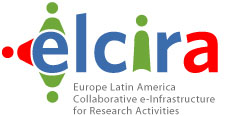 |
|
||||||
 |
|||||||
|
Work Package (WP3): Standards for an Interregional Videoconference Service Objectives
Description of work and role of partners Videoconference services are one of the most demanded services on academic networks. The benefits of videoconference services include, but are not limited to: a) saving travel costs for academic institutions; b) increasing knowledge-sharing by allowing more frequent meetings; c) empowering scientific areas such as telemedicine; d) improving cultural work and research by sharing musical events and developments; e) increasing the efficiency of management teams and teleworking, among many others. Videoconferences have different qualities and uses. For instance, webconference services or desktop videoconferences, where a PC and a webcam provide the necessary video and sound systems, are very convenient for short working meetings. Instead, for long meetings, executive meetings or special applications such as the use of this tool in medicine, astronomy, arts or any discipline where high quality video images is necessary, i.e. HD TV type of resolution, require specialized equipment using H.323 protocol and a room setup where the sound and the lighting are carefully crafted to produce an immersive environment. This type of videoconferences, including, but not limited to Virtual Presence, will be referred to as HQVCS. High-quality videoconferences are possible due to recent developments on video coding and the high speed of academic networks. Special end user equipment and rooms are required to produce the immersion effect. Moreover, when more than two rooms are required to be part of the same videoconference, a specialized equipment (Multipoint Control Unit, or MCU) is also necessary. The use of these equipments require scheduling, the adequate knowledge of the locations where the researcher can find them (Directories), a use policy, an operations scheme, a help desk service, and a costing agreement, a clear definition of the protocols and services that can provided when using several types of equipment among others. This is specially true when several MCUs are necessary to provide the service to a large audience. Latin America and Europe have been working on similar projects to achieve a regional service across borders independently. For instance, RedCLARA has developed the Integrated Videoconference Services (SIVIC) project. The SIVIC project included the collaborative development of policies, operational procedures, certification procedures and a reservation system (SAR) to provide videoconference services. In Latin America the SIVIC project was developed by RedCLARA with the NRENs RNP (Brazil), RENATA (Colombia), REUNA (Chile), REACCIUN (Venezuela) and CEDIA (Ecuador). In Europe, the eduCONF project aims to deploy an integrated videoconference service across GÉANT. EduCONF is developing certification programs and the knowledge-sharing required to implement videoconference services in Europe. This WP will focus on establishing agreements and a pilot system between Latin America and Europe that will make it possible to establish an interoperable High Quality Federated Videoconference Service working on H.323 and telepresence platforms including interfaces for user access to the service. Along the project development, RedCLARA will implement a gatekeeper system and a dialing scheme that will enable the integration with its European counterparts. The resources directory, certification processes, dialling and usage documentation will be prepared in both sides of the Atlantic. The above will permit to provide a global vision of the service to end users. T3.1 – Determine the scope of a future High Quality Video Conference Service (HQVCS) T3.2 – Define agreements on standards for federated Directory Services for the HQVCS T3.3 – Technical evaluations of HQVCS exchange point architecture for future service integration between LA
and Europe T3.4 – To develop a Pilot test as proof of concept |
|||||||
|
|||||||
